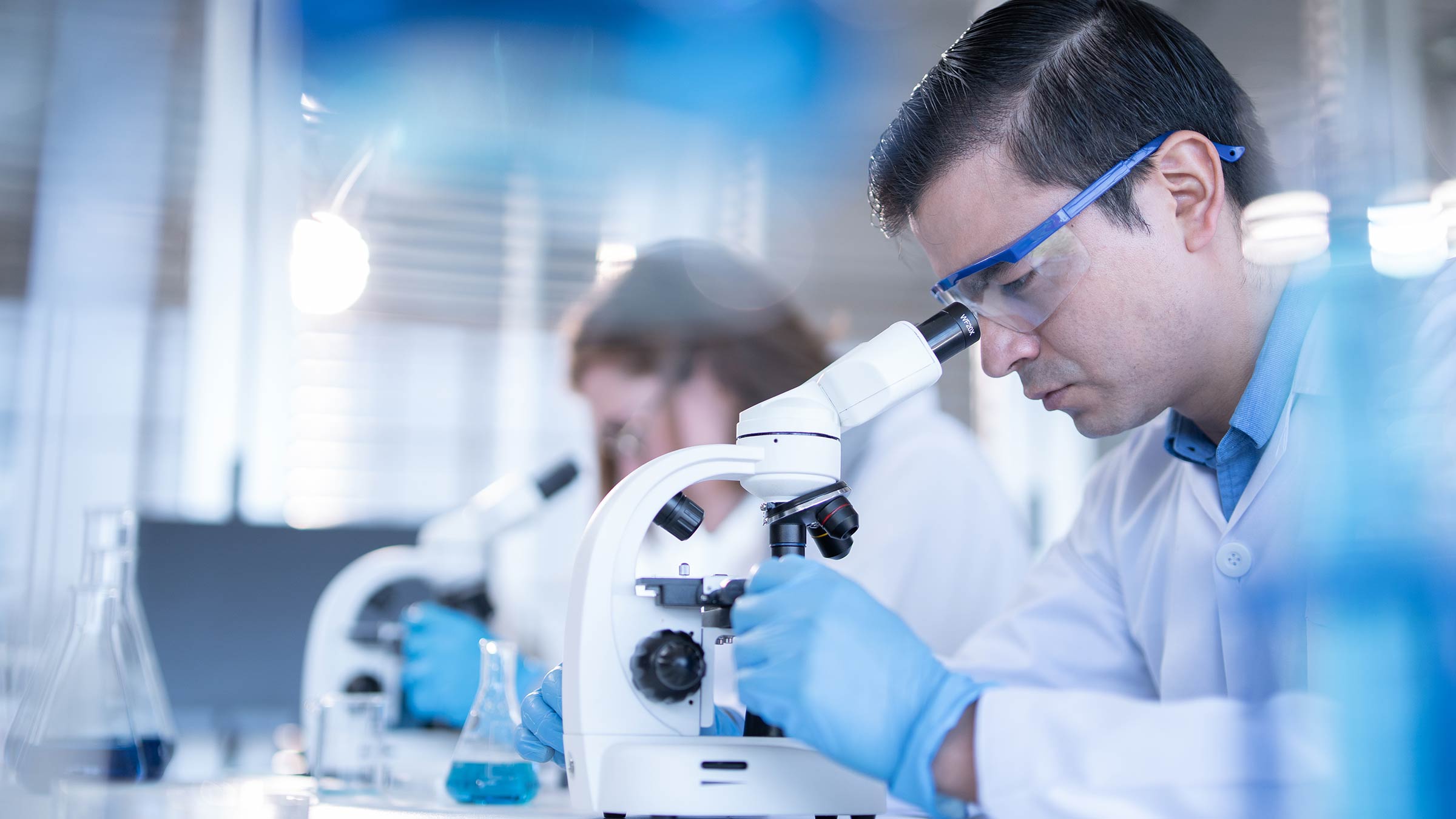
Lynch syndrome (LS) is a hereditary genetic disorder that greatly increases a person’s risk for cancer — mainly colorectal and endometrial (uterine) cancer, but also ovarian, stomach and other forms of the disease. People with LS also tend to be diagnosed with cancer at an earlier age than people in the general population.
So how can you determine whether you carry these genes, and what to do if you do carry them? As a genetic counselor, I’ll explain.
What causes Lynch syndrome, and how is it inherited?
Every cell in our body has 46 chromosomes that come in pairs — 23 from one parent and 23 from the other. Each chromosome contains thousands of genes that are made up of DNA and contain inherited information that acts as instructions for helping our bodies function properly. Any change, or mutation, in this genetic information can cause the gene to malfunction or stop working.
LS is caused by a mutation in one of five genes — MLH1, MLH2, MSH6, PMS2 or EPCAM — that are involved in repairing mistakes in our DNA that can occur during the body’s natural cell-division process. If you’ve inherited a mutation in one of those five genes, your body can’t properly repair DNA, increasing your risk for developing cancer. This is known as Lynch syndrome, named for the late Henry T. Lynch, MD, a geneticist whose work helped identify hereditary causes of cancer.
What are the chances of inheriting Lynch syndrome?
Everyone has two copies of each of the five LS genes, one from each parent. If one of your parents has a gene with an LS mutation, you may inherit that parent’s LS gene that carries the mutation, or you may inherit that parent’s properly working LS gene. Thus, if your parent has Lynch syndrome, you have a 50% chance of inheriting the LS gene mutation and an increased likelihood of developing certain cancers.
Why is screening for Lynch syndrome important, and when should it be done?
Screening for Lynch syndrome in families that have this disorder is important, because discovering inherited LS genetic mutations in individual family members will enable them to take precautions against cancer, such as earlier and more frequent screenings for particular cancer types.
Someone in every family is always the first to test positive for an inherited genetic mutation such as LS. The next step is for them to share this information with as many family members as possible, so that they also can be screened for this disorder. This is called cascade testing, and it’s extremely beneficial for helping people guard against certain cancers.
At Ohio State, we have one of the largest and most advanced genetic counseling programs in the nation, with 12 genetic counselors who support the cancer program and specialize in specific types of cancer. For example, I see our uterine cancer patients with LS. I also specialize in cascade testing, and I conduct research on developing communication strategies that help family members better share genetic information with each other.
What are the screening tests for Lynch syndrome?
There are two screening tests for LS: microsatellite instability (MSI) testing and immunohistochemistry (IHC) testing. Either or both tests can be performed on a tumor sample from a person suspected of having LS, and they’re often performed prior to testing for specific gene mutations.
MSI refers to changes in areas of DNA called microsatellites. The majority of colorectal and many uterine cancers stemming from LS are MSI-positive, so a diagnosis of LS is more likely if a person’s colon or uterine tumor is MSI-positive.
In IHC testing, special stains can show whether proteins made by LS genes are present in the tumor. If someone has an LS gene mutation, that gene’s protein will usually be absent in the tumor. IHC can help direct genetic testing so that only one of the five LS genes may need to be tested.
Which screening test should be performed?
A person with an MSI-positive tumor will usually have at least one stain absent on the IHC test. Likewise, someone with an absent stain on the IHC test will usually have an MSI-positive tumor. When possible, we order both tests because they can double-check on each other.
How are the specific Lynch syndrome gene mutations detected?
By taking a blood or saliva sample from someone who has had colorectal, uterine or other cancers associated with LS, laboratory technicians can search for mutations in the LS genes. Once a mutation has been found in an LS gene, the lab can look for that same mutation in other family members — whether or not they have had cancer — to see if they have LS.
Since multiple genes are involved in LS, it’s most cost effective to test all of them simultaneously in what we call a gene panel. Researchers at the OSUCCC – James have tested a one-step gene panel screening process that enables us to determine whether someone has an LS mutation while also screening for other gene mutations associated with cancer. This process produces results faster and more accurately than the former screening process, which could involve up to six tests.
To determine the effectiveness of panel testing, OSUCCC – James researchers used gene sequencing to examine 419 unselected tumor samples in addition to 46 tumors from patients known to have LS and accurately identified 100% of the LS cases. The previous standard screening process for LS identified only 90% of the cases.
Thanks to this new screening method, thousands of people could receive diagnoses needed to treat their cancer more effectively than ever. The innovation could also uncover genetic information in time to help doctors prevent some cancers from developing at all. We view this test as the likely future for helping to diagnose and properly treat all cancers.
If a person has a Lynch syndrome gene mutation, what are the options for cancer screening and prevention?
People who have Lynch syndrome have several choices. At a minimum, they should have screenings to help find cancers at the earliest possible stage. For colorectal cancer, this means a yearly colonoscopy to detect and remove precancerous polyps or to diagnose cancers early, when they can be more easily treated.
In people with LS who have uteruses, an annual pelvic examination, ultrasound and small biopsies of the uterus are recommended to screen for uterine cancer. Screening for ovarian cancer isn’t very effective, but these people can choose to have an additional blood test to help find ovarian cancer early.
Another preventive option is surgery to remove at-risk body parts before cancer develops, such as a hysterectomy (removal of the uterus, ovaries and fallopian tubes) after the person is done having children. Risk-reducing colectomy (removal of the colon) is usually considered only when a person is unable to follow the LS colonoscopy screening recommendation. It’s also been shown that daily use of 600 mg of aspirin for at least two years lowers colon cancer risk by almost 60%.
Does Lynch syndrome screening have documented benefits for patients and their family members?
Over $4 million in funding from Pelotonia, the annual cycling event that raises millions of dollars for cancer research at Ohio State, supported a five-year statewide initiative to screen newly diagnosed colorectal cancer patients and their biological relatives for LS via a network of 50 community hospitals around Ohio. This study enrolled over 3,300 patients, of whom 143 tested positive for LS. Through subsequent screenings, over 200 of these patients’ relatives also tested positive for LS, and more than 100 colorectal cancer patients were found to have a hereditary cancer syndrome other than LS.
Our findings clearly demonstrated the value of screening early-onset colorectal patients for LS and their family members, and we are working to help launch this screening approach nationally. One of the major advantages of learning LS test results is reduced uncertainty about the risks of cancer and being able to take precautions for avoiding it. In addition, testing may allow doctors to modify medical care to decrease the risk of all LS-associated cancers.
Genetic counselors at The James offer expert guidance
Deciding whether to participate in LS gene testing can be complex, but our Genetic Counseling Program at The James stands ready to assist. Anyone who has questions or needs guidance may contact us at 614-293-6694 of toll-free at 888-329-1654.

Accurate, early cancer diagnosis matters
The James Cancer Diagnostic Center gives patients direct, expedited access to diagnostic testing and consultation with Ohio State cancer experts.
Schedule an appointment today




